|
| |
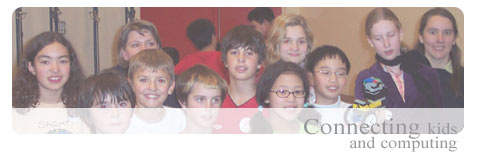 |
| Spring 2006 |
| |
Welcome to our first newsletter! We hope you enjoy the following articles. We would like to feature other Jade projects in the next newsletter, and have a forum for people to share their stories. Let us know how you are doing, what inspires you about science or engineering, and if we can profile you or your project in our fall newsletter. What else would you like to see in the newsletter? Get in touch with Anne (condon@cs.ubc.ca) and Michele (mng@cs.ubc.ca).
First Lego League Competition
Full Article
Canada-wide Mentor Program Gives Female Undergrads a Glimpse into the Day in the Life of the Graduate School Experience
Full Article
Associate Professor Gail Murphy on Why Mentors Matter
Full Article
Soft Skills for Hard Scientists
Full Article
CS Undergrad Leads Kits High Students in First Robotics Competition
Full Article |
| |
|
| |
|
| First Lego League Competition: An Intense Learning Experience for Elementary Students |
|
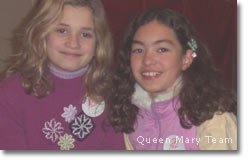
In a two-storey, red brick schoolhouse on the west side of Vancouver, a group of students - young scientist wannabes - are celebrating their participation in the First Lego League championships held at Carson Graham Secondary in North Vancouver earlier in the Fall.
As the lunch bell sounds and the pizzas arrive, so too does their coach Anne Condon, a professor in the Department of Computer Science at UBC, a parent of the team members, and also the NSERC/GM Chair for women in science and engineering for BC and Yukon. Kim Thomas, a dedicated parent volunteer with two kids on the team, was in attendance as well, praising the kids for their accomplishments and using the time with them to help them review what they learned while working on this after-school project.
For two months, Condon (who is on a year-long sabbatical from UBC) and Thomas worked with the team of nine kids, mainly Grade 6 and 7 students of which 50 percent were females chosen specifically because as Condon says, the girls are approaching that age where they typically begin to lose interest in math and science subjects. Hopefully, their involvement in this project and the experience they had will persist as a positive one to impact that, she says.
"The girls are approaching that age where they typically begin to lose interest in math and science subjects. Hopefully, their involvement in this project and the experience they had will persist as a positive one to impact that."
First Lego League is an international program for children ages 9-14 that combines a hands-on, interactive robotics program with a sports-like atmosphere. Teams consist of up to 10 players and focus on team building, problem solving, creativity, and analytical thinking as they attempt to accomplish a mission using LEGO MINDSTORMS technology. They also search the web, talk to scientists, visit the library and develop presentations.
Team member Michelle Kunimoto, Grade 7, said she liked the idea of being on the team because she likes solving puzzles and logical problems. Her friend Hannah Reid, in Grade 6, said the hard part about the project was predicting what was going to go wrong and how to work around that by programming the robot. Angus Lim, in true scientific form, was still analyzing the team's performance, wondering if perhaps the reason their robot had been slower than they would have liked was because the table they got assigned to on the day of the competition was at a slight tilt. Overall, when the robots completed their missions (or not), the young scientists took 10th place out of 24 teams in a competition that sees three rounds of 2.5 minutes each.
When asked if he thought it would have made a difference if boys and girls had been on separate teams, Peter Thomas, a Grade 5 student said with insight way beyond his years, "I don't think it's a gender problem, it's more of a person problem." He was referring to the importance of teamwork and other team members agreed. As in life, working together seemed to be the biggest learning experience of the competition.
|
|
|
| Canada-wide Mentor Program Gives Female Undergrads a Glimpse into the Day in the Life of the Graduate School Experience |
| |
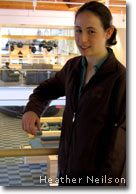 Last summer, Heather Neilson, a fifth year student in the Cognitive Systems Program at UBC, got to find out what it's like being a graduate student and an active participant in a research lab at UBC. She participated in a program that encourages undergraduate women in computer science and computer engineering to go to graduate school by exposing them to the research environment. Last summer, Heather Neilson, a fifth year student in the Cognitive Systems Program at UBC, got to find out what it's like being a graduate student and an active participant in a research lab at UBC. She participated in a program that encourages undergraduate women in computer science and computer engineering to go to graduate school by exposing them to the research environment.
The Canadian Distributed Mentor Project matches female students who have finished their second or third year of undergraduate studies with female professors for a summer of research and mentoring. It awards $3,500 to each student to supplement an NSERC Undergraduate Student Research Award (USRA) in Universities, which provide $4,500 (+ travel). Each student receives a total of $8,000 (+ travel) for 16 weeks of work. In addition, $1000 is awarded to each mentor, to offset research and mentoring costs.
"The program was like seeing a day in the life of a grad student, she says. I didn't know that grad students participated in reading groups, how they were "housed" in the Department in terms of their own personal space, that they sometimes get to go to conferences and how they distribute their time."
Neilson, who is in the cognition and brain stream of the Cognitive Systems Program participated under the direction of Assoc. Prof. Cristina Conati, a member of the Laboratory for Computational Intelligence. Conati specializes in combining aspects of artificial intelligence, Cognitive Science and HCI to make complex interactive systems more adaptive to the needs of users. Conati's grad students are working on a project called ACE or Adaptive Coach for Exploration, a tool for high school math students allowing them to manipulate, and explore constant, linear, power and polynomial functions. She spent the majority of her time adding new functions to the program and the experience has helped fine-tune how she envisions computer science fitting into her future.
Heather is considering grad school and knows that the project she worked on as part of the Mentor Project will be a big advantage if she chooses to take that step. "The program was like seeing a day in the life of a grad student, she says. I didn't know that grad students participated in reading groups, how they were "housed" in the Department in terms of their own personal space, that they sometimes get to go to conferences and how they distribute their time." In spite of not having much programming experience except for having completed CPSC 211 which teaches JAVA, when she expressed her interest to Conati, she was invited to work in the lab from May through August.
To get a glimpse into the life of Heather's time in the lab you can read her journal here.
Another Cognitive Systems student Katherine Irvine, was placed with Assoc. Prof. Gail Murphy, of the Software Practices Lab within the UBC Department of Computer Science. Irvine worked on an Eclipse plug-in called Active Aspect. To see the type of research she was involved with, you can read her final report here.
Other students and mentors who participated in the Canadian Distributed Mentor Project include:
- Wei Cao, York U., with mentor Aijun An;
- Ying Chen, U. Windsor, with mentor Arunita Jaekel;
- Vicki Ha, Dalhousie University, with mentor Kori Inkpen;
- Kim Hansen, U. Lethbridge, with mentor Margaret-Anne Storey, U. Victoria;
- Shannon Little, U. British Columbia, with mentor Karon Maclean;
- Vera Ranieri, Mount Allison, with mentor Laurie Ricker;
- Genevieve Roberge, Universite du Qubec en Outaouais, with mentor Rokia Missaouil;
- Shirin Sohrabi, U. Toronto, with mentor Sheila McIlraith.
The websites of all the 2005 participants are here.
The Canadian Distributed Mentor Project is coordinated by Faith Fich, a Professor in Computer Science at U. Toronto, and is co-sponsored by the Computing Research Association's Committee on Women. |
|
|
| Associate Professor Gail Murphy on Why Mentors Matter |
| |
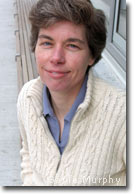 Assoc. Professor Gail Murphy is one excellent example of why the right mentor can change your future. After completing a Bachelor’s degree from the University of Alberta, she worked for five years as a software developer before even thinking about returning to do a Master’s program. And, it was a Master’s not a PhD, she was intent on getting. That is until she met her advisor David Notkin from the University of Washington. “As a supervisor he has the ability to really hone in on people’s strengths and be honest about their weaknesses,” she says. As a result, inspired by Notkin, she did continue on to a PhD and now as well as being a respected researcher, she is, in her own words, “helping others reach their goals” referring to the process of supervising her own graduate students. Assoc. Professor Gail Murphy is one excellent example of why the right mentor can change your future. After completing a Bachelor’s degree from the University of Alberta, she worked for five years as a software developer before even thinking about returning to do a Master’s program. And, it was a Master’s not a PhD, she was intent on getting. That is until she met her advisor David Notkin from the University of Washington. “As a supervisor he has the ability to really hone in on people’s strengths and be honest about their weaknesses,” she says. As a result, inspired by Notkin, she did continue on to a PhD and now as well as being a respected researcher, she is, in her own words, “helping others reach their goals” referring to the process of supervising her own graduate students.
Murphy believes the most important factor in choosing a mentor is feeling like you can talk to them. “You need to pick someone you’re comfortable with, someone who’s further along the path than you and hopefully someone who’s on a path that taps into what you’re interested in doing in the future,” she says.
"You need to pick someone you’re comfortable with, someone who’s further along the path than you and hopefully someone who’s on a path that taps into what you’re interested in doing in the future"
A lot of students and laypeople are blindsided by the term research she says. You say the word research and immediately it shuts down conversation because they think of someone working alone in a corner at a university. In fact, says Murphy, the benefit of doing a Master’s degree in Computer Science at a Canadian university is that students typically complete a significant research project and that’s important because it means developing skills such as presentation, communication and project management as well as technical".
"In the end, students could find themselves as a leading technical person in a company or a leading researcher in their field, the head of a department at a university or the Chief Technical Officer at a company as just a few examples of the diversity of where their education may take them". She views an important part of a graduate degree as a networking opportunity. Fellow students go on to an amazing variety of careers and that’s why choosing a “good” school to do graduate work is important. “When, I look at what students have gone on to do, I feel like I played some small role in that,” she says. Murphy and another master’s student were the mentors for Katherine Irvine, a third year computer science student in the Canadian Distributed Mentors Project. |
|
| Soft Skills for Hard Scientists Workshops |
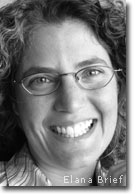 In academic environments so much time is spent on mastering the subject matter that abilities in communications are undervalued and necessary skills are never taught says Elana Brief, a Research Associate at SFU’s Physics Department, who, along with UBC graduate students Donna Dykeman and Erin Young, is coordinating a series of three workshops for women graduate students and postdoctoral fellows called Bridging Transitions: Soft Skills for Hard Scientists. In academic environments so much time is spent on mastering the subject matter that abilities in communications are undervalued and necessary skills are never taught says Elana Brief, a Research Associate at SFU’s Physics Department, who, along with UBC graduate students Donna Dykeman and Erin Young, is coordinating a series of three workshops for women graduate students and postdoctoral fellows called Bridging Transitions: Soft Skills for Hard Scientists.
Elana is referring to the fact that by the time women have completed their education they have not learned to articulate their ambitions and define their sense of purposeful work. “They receive little to no training in the interpersonal skills necessary to assert and negotiate their visions for themselves effectively,” she says. ”How is a woman to make a successful transition into a satisfying career if she is wary of voicing her own dreams to herself, let alone speaking them out loud or writing them down?” This ambivalence often comes out in other ways: women undercharge for services, they don’t put themselves up for promotion, they rationalize their decisions to remain underpaid and underacknowledged by telling themselves they're working for the love of it, not for the glory (or, by extention, the money).
"How are women able to make successful transitions into a satisfying career if they’re wary of voicing their own dreams to themselves, letting alone speaking them out loud or writing them down?"
Elana found the subject compelling when, after completing her own PhD, she sensed her own ambivalence about moving into a faculty position. In fact, she had been reading the book Necessary Dreams: Ambition in Women’s Changing Lives when she attended a lecture by Professor Anne Condon who discussed The Jade Project at an event organized by the Society for Canadian Women in Science and Technology (SCWIST). Almost immediately she recognized that the project might provide the avenue to host workshops that would focus on these types of issues. "I don't know of any programs aimed at graduating women to help them with transitions into professional positions," says Elana. “Because assessment in the sciences is not subjective, it may seem that we function outside of the emotional or personal realm, yet in order to have a highly functioning lab, conflict resolution skills, empathic listening and all those related abilities in communication are necessary,” she says.
Elana Brief is the founder of UBC’s Let’s Talk Science program and, in the process of negotiating her own transition from education to career, she sees the vital importance of supporting other scientific women in this stage.
Jade Project funding enabled Elana to hire Lil Blume, a communications consultant from Toronto, to develop and facilitate communications workshops for women graduate students in the Sciences.
An interview with communications consultant Lil Blume:
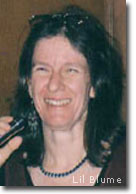 We all have choices. That’s the main message in the Soft Skills for Hard Scientists workshops Lil Blume is conducting with graduate students and postdocs at SFU and UBC. We all have choices. That’s the main message in the Soft Skills for Hard Scientists workshops Lil Blume is conducting with graduate students and postdocs at SFU and UBC.
"There’s always another way of approaching a conflict. Perhaps seeing that they can look at things in several ways is what students find most comforting about the workshops," she says.
In the "Facing Conflict with Confidence" workshops, participants worked on finding tools to solve interpersonal conflicts they had in their jobs, classrooms, labs, and families. They soon realized that they were not alone in the kinds of conflicts they faced as women scientists. Blume says her workshops bring out a lot of frustration and often feelings of invisibility among academic women. She says, "Research has shown that not only do men give more attention to men but women give more attention to men as well."
"Research has shown that not only do men give more attention to men but women give more attention to men as well."
Men seem to have a sense of entitlement about being in their positions whereas women are often more ambivalent about expressing their needs and issues. The workshops in the JADE project are helping women strengthen the feelings they may have about their careers and develop communication skills to face conflicts and address others when they feel overlooked or invisible.
In addition to these workshops and ongoing consulting work, Blume co-teaches an undergraduate credit course for the Computer Science Department at the University of Toronto called Communication Skills for Computer Scientists.
|
|
| CS Undergrad Leads Kits High Students in First Robotics Competition |
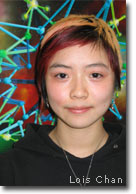 Building on her own high school experience in robotics when she participated in a competition known as Canada FIRST, Lois Chan, now a third year UBC computer science student spent some of last year mentoring 30 Kitsilano High school students, preparing them to compete in the FIRST Robotics Competition. Building on her own high school experience in robotics when she participated in a competition known as Canada FIRST, Lois Chan, now a third year UBC computer science student spent some of last year mentoring 30 Kitsilano High school students, preparing them to compete in the FIRST Robotics Competition.
Canada FIRST, the event that Chan participated in, saw 11,000 students, teachers and engineering mentors from B.C., Alberta, Manitoba, Ontario, Quebec, New Brunswick, Nova Scotia, Newfoundland, Nunavut and California take part in a program that survived 10 years before a lack of funding concluded its existence.
The US FIRST Robotics Competition is now the event du jour with regionals taking place in Toronto over a three day competition and 28 teams from across Canada competing. MDA and UBC were the major sponsors of the Kitsilano teams, allowing 10 student competitors and their coaches each year to compete in Toronto in the past two years.
In the first year of participation, the Kitsilano Demons placed 8th with the 2005 team placing third, co-captained by Chan and Alex Johnson, now a UBC Engineering student.
The robot the Kits students worked on under Chan’s mentorship consisted of moving tetrahedral frames into a tic tac toe formation and stacking the objects on top of each other for points. In previous years, Pacman and hockey were played as the "sport" of the competition.
The FIRST Robotics website describes the competitions as high-tech spectator sporting events, the result of a lot of focused brainstorming, real-world teamwork, dedicated mentoring, project timelines, and deadlines.
Chan says the competition goes beyond just the design and construction of the robot. The team must also fundraise and document each step of the process -- the entry fee alone was $7,000. All tasks are carried out by Grades eight through 12 students.
In addition, to leading the team, Chan’s communication skills were challenged. She had to work on a variety of areas from fundraising and public speaking, to writing essays on subjects she was not too familiar with -- and getting her fellow students to do the same. The design and construction of the robots, she says, went smoothly in comparison. Last year she worked in conjunction with Kirk Richardson, then-captain of the team.
Chan is currently working full-time for Sr. Instructors George Tsiknis and Patrice Belleville adding more functions to enable advisors and students to book appointment more efficiently through CSSIS. She's taking a combined degree because she's interested in some aspect of Bioinformatics when she graduates. She comes by her interest in computer science rather naturally it would seem. Her mother is a software trainer and her father is a programmer.
|
| |
|
| |
|




 Last summer, Heather Neilson, a fifth year student in the Cognitive Systems Program at UBC, got to find out what it's like being a graduate student and an active participant in a research lab at UBC. She participated in a program that encourages undergraduate women in computer science and computer engineering to go to graduate school by exposing them to the research environment.
Last summer, Heather Neilson, a fifth year student in the Cognitive Systems Program at UBC, got to find out what it's like being a graduate student and an active participant in a research lab at UBC. She participated in a program that encourages undergraduate women in computer science and computer engineering to go to graduate school by exposing them to the research environment.  Assoc. Professor
Assoc. Professor  In academic environments so much time is spent on mastering the subject matter that abilities in communications are undervalued and necessary skills are never taught says Elana Brief, a Research Associate at SFU’s Physics Department, who, along with UBC graduate students Donna Dykeman and Erin Young, is coordinating a series of three workshops for women graduate students and postdoctoral fellows called Bridging Transitions: Soft Skills for Hard Scientists.
In academic environments so much time is spent on mastering the subject matter that abilities in communications are undervalued and necessary skills are never taught says Elana Brief, a Research Associate at SFU’s Physics Department, who, along with UBC graduate students Donna Dykeman and Erin Young, is coordinating a series of three workshops for women graduate students and postdoctoral fellows called Bridging Transitions: Soft Skills for Hard Scientists.  We all have choices. That’s the main message in the Soft Skills for Hard Scientists workshops Lil Blume is conducting with graduate students and postdocs at SFU and UBC.
We all have choices. That’s the main message in the Soft Skills for Hard Scientists workshops Lil Blume is conducting with graduate students and postdocs at SFU and UBC.  Building on her own high school experience in robotics when she participated in a competition known as Canada FIRST, Lois Chan, now a third year UBC computer science student spent some of last year mentoring 30 Kitsilano High school students, preparing them to compete in the FIRST Robotics Competition.
Building on her own high school experience in robotics when she participated in a competition known as Canada FIRST, Lois Chan, now a third year UBC computer science student spent some of last year mentoring 30 Kitsilano High school students, preparing them to compete in the FIRST Robotics Competition.